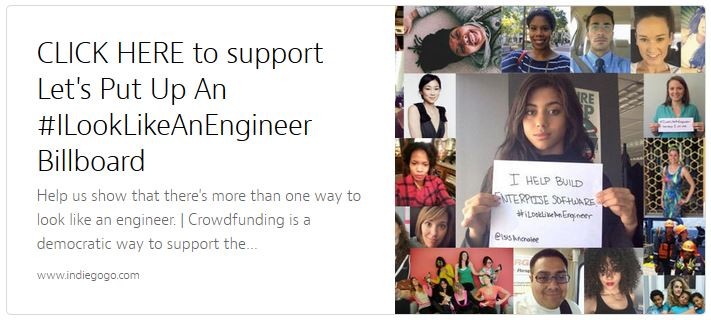It all started with an ad campaign from OneLogin, a San Francisco based tech firm. The simple recruiting campaign featured a young attractive woman engineer named Isis Wenger. It got more social media attention than anyone expected.
As expected, some commenters discussed her sex appeal. Deeming her too sexy to be an engineer and only used to attract more guys into the field. Another suggested that this attractive olive-skinned girl in the poster was ‘a ghost’, an engineer who only existed in the ad agency’s wishful imagination.
The fact is in the United States, women make up between 20% and 25% of people in tech fields. So I do get the ghost analogy. Having worked as an engineer and taught introductory engineering classes, I can attest to the lack of women in engineering and tech. As an engineering student I received some open hostility from professors. But that was back when the dinosaurs roamed the earth. Surely things have changed in 2016.
Wrong! Below are quotes from Isis’s post on Medium.com.
“I’ve had men throw dollar bills at me in a professional office (by an employee who works at that company, during work hours). I’ve had an engineer on salary at a bootcamp message me to explicitly “be friends with benefits” while I was in the interview process at the school he worked for.”
In response to the sexist comments over the recruiting ad, Isis (@isisAnchalee on Twitter), created the #iLookLikeAnEngineer Twitter hashtag. She even created a website, a safe place for women in tech to gather and support one another. It’s called ilooklikeanengineer.com. Face-to-face support groups are also in the works.
And oh yeah, there’s also a billboard campaign:

Isis and her San Francisco supporters have been busy. Good for them. It’s going to take a concerted sustained effort to get to the root of what she rightfully calls deep underlying issues. She goes on to say, “There is a significant lack of empathy and insight towards recognizing that their “playful/harmless” behavior is responsible for making others inappropriately uncomfortable. This industry’s culture fosters an unconscious lack of sensitivity towards those who do not fit a certain mold.”
Why does male-female diversity matter in STEM fields? Here’s my take (backed by math, of course):
- Women in tech made up 35% of total workers in the 1990 according to the American Association of University Women (AAUW). In 2014, AAUW put it at 26%. I think they’re being generous.
- Women in STEM earn way less than men in their same field. According to some reports its 20-30% less for women.
- Only 25% of women who leave STEM jobs to start families end up returning says a Society of Women Engineers report. Some speculate women don’t return because they are seen as weaker and less qualified for having taken a break. Anecdotally, men who have taken a break for health or family reasons were given a better reception back into STEM.
- STEM teams with women perform better, innovate more. Thought leaders and researchers worldwide are waking up to this observation. The popular saying is becoming ‘homogeneity is bad for business.’
Introverted Isis did not back down from the overt sexism. I’m sure like many women in STEM, she genuinely loves her job and wants to continue to work in the field. So she posed a simple but establishment-rocking question: “Do you not fit the “cookie-cutter mold” of what people believe engineers ‘should look like?'” Of course, I posted my own tweets. So did many other women in STEM.
Isis has garnered a groundswell of support and responses from social media and mainstream media around gender diversity in STEM. I’m happy for it and I’m curious to see how it spreads across US and around the globe.
Are you a woman in a STEM field? What’s your story?